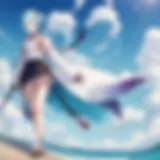Exploring Fairy Tail: The 100 Year Quest Manga Unveiled


Preface to the Series
Fairy Tail: 100 Year Quest continues the story of the beloved Fairy Tail franchise. It falls under the genres of fantasy, adventure, and action, much like its predecessor. This sequel manga was launched in July 2021, following the original series that captivated audiences from 2006 to 2017. The manga is serialized in Weekly Shōnen Magazine. The art is still by Hiro Mashima and is supported by the collaborative work of Atsuo Ueda for the manga adaptations.
The significance of Fairy Tail: 100 Year Quest lies not only in its continuation of the narrative but also in its expansion of themes and character arcs. Fans can reconnect with familiar characters like Natsu Dragneel, Lucy Heartfilia, and others, continuing from where they left off in the earlier Fairy Tail saga. Naturally, it became a subject of anticipation following the conclusive arc of Fairy Tail, demonstrating a vibrant interest still surrounding the series.
The reception among fans has generally been positive, with significant enthusiasm but also scrutiny regarding the continuation of beloved storylines. The blend of nostalgia and new elements in this series deserves a closer examination, amplifying what many admire about the original work.
Staff and Cast Details
The creation of Fairy Tail: 100 Year Quest involves talents both familiar and new that contribute to its revival. Hiro Mashima, the original creator, continues to steer the franchise, bringing his distinctive style and engaging storytelling. His experience has shaped characters and the storyline significantly over nearly two decades.
A collaboration involves key figures within the manga production, many of whom have also worked on the original series. The knowledgeable staff ensures continuity, providing the fans with expectations of how arcs will unfold while pushing creative boundaries further.
Moreover, voice actors have returned to reprise their roles if the anime goes into production. Noted talents like Yuri Lowenthal, Cherami Leigh, and others express the same characters with depth. Their involvement helps bridge the worlds of manga and animation and reinforces recognition among fans.
Theme Music Analysis
Though the manga has yet to introduce a dedicated volume about the theme music, serial adaptations often feature iconic openings and endings that resonate hugely with the audience. Previous theme songs encompassed emotive lyrics paired with captivating melodies.
Composers and musicians who create this theme music elevate the thematic elements of narratives that unfold on screen. Lyrics infuse personality into the songs while reflecting central motifs explored in the respective story arcs. Previous series openings embodied themes of friendship and determination, fundamental elements within Fairy Tail lore. Observing and analyzing them reveals a deeper connection to the characters' challenges and triumphs.
Plot Summary and Analysis
Fairy Tail: 100 Year Quest revolves around the Fairy Tail guild taking on a monumental task: completing a quest that has remained unfulfilled for a century. This expanding narrative frames new obstacles while existing characters mature. As the story unfolds, the loyalty and growth between the characters serve as reflective devices.
Key story arcs evolve that showcase James Jenkins, the dragon who orchestrates exciting conflict and tension, leading our heroes through inventive and rigorous encounters that stretch realms of power, friendship, and emotional growth.
Notably, there are several unexpected turns, some revisiting classic trials from earlier editions while transitioning the established character development into matured relationships. Observers might find poignant moments marking blues and celebration as old ties challenge the creation of new ones.
Reception and Impact
Since its inception, Fairy Tail: 100 Year Quest has maintained popularity among fans, echoing a beloved legacy from the original series. Review summary often highlights its intricate plots and character reconnects and praises its visual appeal. Similarly, it has received critique for pacing and consistency, revealing a division among loyal fans.
The impact goes beyond mere reception; it serves to captivate a new generation drawing interest in fantasy narratives. A legacy intertwined in today's creator-driven spaces urges others constructing narratives across the anime landscape, inspiring aspirants aiming replication of boldly defined characters and plots.
Comparisons remain plentiful as newer series emerge, highlighting similar themes but with subtle differences that make individual series shine distinctively. Fairy Tail: 100 Year Quest firmly cements its place within the Fairy Tail canon while offering fresh delight and excitement based on an established foundation. It's interesting for readers and allows discussions among longtime fans about vigor in newcomers.
�“Understanding where stories fit into cultural landscapes enriches experiences with manga, like peeling back layers of complexity while delving into beloved tales.”
Prelude to the Fairy Tail Manga
The world of manga has seen many remarkable series, but very few have created a following as robust and enduring as Fairy Tail. This section delves into the foundational aspects that make the Fairy Tail franchise compelling, especially the 100 Year Quest sequel. Understanding the journey of the original series prepares readers to appreciate the current narrative and character dynamics borne from it.


Overview of the Original Fairy Tail Series
Fairy Tail, created by Hiro Mashima, first captured audiences in 2006 and quickly ascended to popularity. The story centers around a guild of wizards and their relationships, trials, and friendships. It intertwines many themes such as loyalty, bravery, and the importance of camaraderie. Each arc progressed to develop a richly woven tale steeped in magic and unique characters who left a profound impact on the readers.
The original series spanned 63 volumes and concluded in 2017, leaving a lasting legacy. Diverse character backgrounds and motivations enriched this arc, forging a strong emotional connection with the audience. By blending action, comedy, and heartfelt moments, the manga kept its readers invested in longer arcs that often tested the bonds among the guild members.
The Transition to Year Quest
After the successful conclusion of Fairy Tail, the 100 Year Quest picks up the narrative four years post the original series finale. This period allows creative exploration into the growth of familiar characters while introducing new challenges.
The term 100 Year Quest refers to a perilous mission believed to be unattainable due to its intricacies and potential dangers. Readers encounter returning characters like Natsu, Lucy, and their compatriots, who are now more seasoned. The continuation does not traverse a linear path; instead, it chooses to remain expansive. The new story arcs and character introductions remain true to the essence of Fairy Tail, creating a balanced transition. Importantly, this series preserves the identity established in the older manga, allowing veterans and newcomers alike to appreciate its incremental development.
As the 100 Year Quest begins to unfold, it builds on the established lore while infusing fresh challenges. This balance is essential to sustain both the nostalgia and the excitement that the readers inherently seek.
Plot Summary of Year Quest
The plot of Fairy Tail: 100 Year Quest is central to understanding the direction and the scale of this sequel manga. This section unravels the intricate narrative threads that connect the characters and their adventures. Knowing what unfolds plot-wise provides context and depth to character motivations and the overarching themes that Hironobu Kageyama explores. A clear comprehension of the plot allows fans to appreciate crucial developments and anticipate future conflicts.
Key Story Arcs
The 100 Year Quest is not just a direct continuation but expands upon the universe with various arcs. Here are some significant story arcs:
- The S-Class Trials: Characters duel each other to strengthen their resolve and skills.
- Mard Geer and the True Dragon: The team faces formidable foes in their quest leading to shocking revelations.
- The Quest for the Legendary Magic: As they travel, they encounter locations rich in elemental power, which adds an energetic layer.
These arcs interlink to form a cohesive storyline, each introducing unique elements and emotional moments. They contribute to the series' appeal by showcasing both battles and camaraderie among characters. The narrative successfully blends action and emotion, maintaining the essence of Fairy Tail while branching anew.
Main Conflict and Goals
The primary conflict springs from the magical elements of Fairy Tail universe, inducing both external and internal struggles for its characters. The protagonists aim to overcome new magical threats while navigating their own relationships. The protagonists include Natsu Dragneel, Lucy Heartfilia, and their guild members. They are back to engage in epic battles. Their goals are:
- To Break Forbidden Seals: Unlocking ancient magic represents both power and danger.
- Alliance Against Common Foes: They'll have to band together with rival guilds to ensure peace.
- Self-Discovery: Characters thereby enhance not only their abilities but their interpersonal relationships.
Their journey is ethically diverse and often twisty. In facing external threats, characters also confront their inner challenges,defined more prominently in 100 Year Quest. The central goals shift from just achieving a title to understanding the importance of friendship and collective growth.
The storyline architecture of Fairy Tail: 100 Year Quest interweaves individual aspirations with group dynamics, showing multifaceted growth beyond mere adventure.
Character Development in Year Quest
Character development plays a crucial role in the Fairy Tail: 100 Year Quest narrative. With an established world and a cast driven by growth and consequence, nuanced character arcs emerge. The series builds upon previous event and shows how existing characters evolve while also welcoming fresh figures into the fold. This blending not only enriches character calculation but provokes exploration of themes like friendship, trust, and determination.
Return of Familiar Faces
In 100 Year Quest, fans find much cause for excitement in the reappearance of classic characters from the original Fairy Tail series. Heroes like Natsu Dragneel, Lucy Heartfilia, and Gray Fullbuster make their comeback, drawing upon their past experiences and established relationships.
The writers smartly utilize nostalgia here. Each character's returning journey highlights how they learned from earlier fights and challenges. This growth leads to a more profound understanding of themselves and their connections. For example, Natsu shows increased resolve as he tackles new challenges. It gives readers a layered and tangible progression.


Moreover, the dynamics introduced result from both differences and similarities between their past involved adventures versus current situations. These alter how characters engage with one another, deepening established friendships and possibly sparking conflicts.
Preamble of New Characters
Bringing in new characters broadens narrative bia and creates a fresher perspective. The introduction of unique faces contributes significantly to the fabric of 100 Year Quest. Characters like Avari and Mavina add depth, shaking up the dynamics of the group. They each embody unique traits along with powerhouse skill sets, helping to reinforce the narrative essentially.
These new individuals are not just adjuncts to the original protagonists; they confront lingering ideas about responsibilities, ambitions and what it means to be a part of a guild. Their presence fosters team dynamics that challenge older characters, compelling them to reconsider and grow just as much.
Moreover, these integrations avoid oversimplified trope portrayals and lend richness to existing story lines. Audiences start to appreciate themes as kinships develop or quickly dissolve based on conflicting aims. This reality brings an authentically gritty touch.
Character Relationships and Dynamics
The relationship interactions among the characters in 100 Year Quest reinforce the main themes beautifully. As old bonds strengthen, tensions of rivalry sometimes flare between them presenting a fuller picture of love and conflict.
How characters react and evolve during critical events shows really underscores their individual and shared journeys. Lucy's sudden clash with responsibilities illustrates strong individual struggle yet affects those nearest to her.
Additionally, undercurrents connecting older and newer characters propel the plot. With the woven ties of friendship binding interestingly across established and fresh roles, conflicts and celebrations feel palpably heightened.
Overall, social webs within this evolving saga provide engaging richness to the manga. Each carefully constructed character fosters further elaboration on core themes whilst enriching the reader’s journey through Fairy Tail: 100 Year Quest. It allows for variable methods of interpretation, encouraging discussion among fans.
Understanding these cunning intricacies truly boosts reader enjoyment and deepens immersion into the storyline.
Art Style and Illustrations
The art style is a fundamental component of any manga, as it encapsulates not just the visuals but also the emotional essence of the story. In Fairy Tail: 100 Year Quest, illustrations amplify the narrative, giving life to characters, settings, and pivotal moments. Readers often connect with stories through their visual representations, and the ability of the artist to convey themes and emotions through their work plays a crucial role in overall engagement. Therefore, it is essential to examine how the art style evolves from the original Fairy Tail series while highlighting character design and visual themes.
Evolution of Art from Original Series
Upon venturing into 100 Year Quest, it is immediately apparent that the artistic style carries forward the hallmarks of the original Fairy Tail. However, it also showcases a clear evolution. The character proportions are now more refined, adhering to a slightly more modern approach. There are several elements that stand out in this evolution:
- Line Quality: The line work has gained precision, enhancing the clarity of movements during action scenes.
- Color Palette: A broader, more vibrant range of colors adds life to the characters and settings, inviting readers to dive deeper into the world.
- Backgrounds: The detailed backdrops further enrich the story, setting a better tone for various scenes.
With these enhancements, the visual storytelling becomes more immersive, enabling long-time fans to feel a sense of continuity while introducing fresh aspects to attract new readers.
Character Designs and Visual Themes
Character designs in 100 Year Quest reflect a thoughtful progression. Each character's visual representation has been tweaked to indicate growth and changes experienced during the previous arcs. For example:
- Natsu Dragneel: Natsu retains his iconic look yet exhibits maturity in his expression and posture, hinting at his evolving responsibilities.
- Lucy Heartfilia: Lucy's design emphasizes her development as a character, integrating elements that highlight her strength alongside femininity.
- New Characters: Introducing new traits to novel characters allows fans to explore original personality dynamics.
The visual themes that permeate Fairy Tail—such as camaraderie, adventure, and magic—are apparent within the illustrations. The visual emphasis on group dynamics, often through elaborate yet cohesive illustrations, strengthens messages of friendship and support. Incorporating various elemental motifs ties back to the central theme of magic, creating an aesthetic coherence that recounts the deeper philosophical undertones of quests and connection.
Important Insight: The art style does not merely portray characters and settings; it serves as a conduit for emotional resonance and strengthens reader connections to the tale being told.
This gradual refinement in 100 Year Quest places it as not just a continuation but also an evolved narrative experience within the broad Fairy Tail universe. The illustrations do more than decorate the story; they are intrinsic to how readers perceive character motivations and the worlds they inhabit.


Reception and Impact
The reception and impact of Fairy Tail: 100 Year Quest are critical aspects to consider when discussing this sequel. These factors reveal not only how the manga resonates with its audience but also its significance within the greater Fairy Tail universe. By analyzing critical reception, community reactions, and fan engagement, one can understand the implications that 100 Year Quest holds for both existing followers and newcomers to the franchise.
Critical Reception
Fairy Tail: 100 Year Quest has had varied responses from critics and reviewers since its release. Many have highlighted the seamless continuation of plots that were established in the original series. The writing remains consistently engaging, and it offers surprises to the fanbase while staying true to its roots. Critics have often noted the balance between nostalgia and innovation as a significant strength of the narrative. The unique arcs unify the new challenge with familiar themes, making it relatable to old fans.
While some reviews remark that certain narrative segments fall into predictable territory, this is tempered by character growth and increased depth. This leads to a final takeaway: most critics have expressed a positive sentiment about the manga despite noting a few weaknesses. Therefore, 100 Year Quest is generally characterized as a worthy successor.
Community and Fan Reactions
Community reactions and fan engagement offer rich insight into the overall impact of Fairy Tail: 100 Year Quest. The transition from the epic battles to the newbie experiences illustrates a development path the fanbase appreciates. Discussion threads on platforms like Reddit showcase various views about character arcs and how they affect relationships. Fans often express excitement about the return of beloved characters while speculating on new introductions.
Additionally, social media reactions reflect a generally enthusiastic sentiment. Many fans share artwork, theories, and creative interpretations, further enriching the dialogue around the manga. Events in the story tend to prompt lively debates, highlighting deep emotional connections that readers maintain.
In summary, the Fairy Tail: 100 Year Quest manga has garnered both critical accolades and a vibrant community response, securing its role as an important part of the Fairy Tail lineage. Critics recognize its accomplishments while fans amplify and celebrate its impact through creative expression. 100 Year Quest successfully garners genuine interest and actively shapes conversations amongst enthusiasts.
Accessing Fairy Tail: Year Quest
The ability to access and engage with the Fairy Tail: 100 Year Quest manga is critical for new and returning fans alike. This section discusses options both for purchasing and for enjoying the manga without cost.
Where to Find the Manga
Fairy Tail: 100 Year Quest is available in several formats. Readers can purchase physical copies through major retailers like Amazon or Book Depository. Local bookstores may also stock the series. For digital consumption, platforms such as VIZ Media offer electronic versions. They provide a convenient way to read manga as it eliminates shipment times.
More fans are turning to digital resources because of their wide reach and accessible options.
Availability of Free Resources
For those looking to read Fairy Tail: 100 Year Quest without making a financial commitment right away, various free resources exist. Websites like MangaPlus deliver the first few chapters without pay. They are updated regularly and grant access to a broad catalog of recent manga releases. Be mindful of laws on fan translations and unofficial sites. Reading from legitimate sources supports the creators and Up to date releases.
In summary, there are multiple ways to access the Fairy Tail: 100 Year Quest manga. The combination of physical purchase options and digital resources allows for many to engage with the story. Always consider reputable sources to enrich your reading experience.
Finale and Future Prospects
In this section, we will discuss the Conclusion and Future Prospects related to Fairy Tail: 100 Year Quest. This sequel not only expands the overarching narrative of the Fairy Tail universe but also offers insights into character evolutions and plot developments that may influence future arcs.
What Lies Ahead
The 100 Year Quest provides fertile ground for further exploration and surprises. As the story progresses, we can expect new challenges and conflicts to arise for our beloved characters. The implications of the quests may attune to broader themes of friendship and perseverance that have defined the series. Specific elements such as the return of formidable enemies or unexpected allies could shape the dynamic of future narratives. Readers may find glimpses of forthcoming sagas hinted at through unresolved conflicts in the current arcs.
Moreover, from the writer’s perspective, the open-ended nature of the 100 Year Quest allows opportunities for improvisation and occasional twists. As the manga builds upon established lore while introducing new locales and adversaries, this could enhance the reading experience for existing fans and establish pathways for newcomers.
Final Thoughts on the Series
Taking everything into consideration, the Fairy Tail: 100 Year Quest stands as a compelling continuation of the original series. The character depth and intricate storytelling facilitate a fresh yet familiar vibe, providing joy for long-time coherence in its world-building. This series effectively captures the essence of hope and growth through adversity which resonated strongly throughout Fairy Tail.
As fans proceed with the narrative, they will find that the encounters and interactions will likely result in further development of not just familiar faces, but also newer ones introduced in this journey. Whether the arcs experience tonal shifts or emotional intensity, it enriches the tapestry of the Fairy Tail legacy.
Ultimately, this continuation holds promise in not just expanding the storyline, but re-investing readers and long-standing followers into a universe that remains ever vibrant through its storytelling magic. > The future is bright for those who seek adventure within the pages of Fairy Tail. Let curiosity guide the way.















